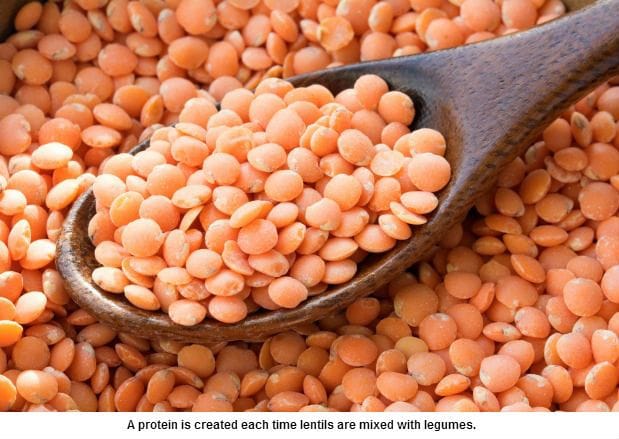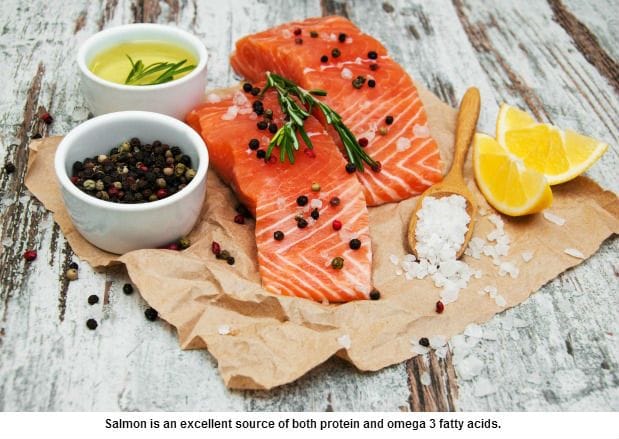As any nutritionist would know, diet greatly affects one’s mental state. It can either increase or decrease neurotransmitters, also known as “chemical messengers,” in our brain. Serotonin and dopamine are two main neurotransmitters that can strongly influence depression and may be altered due to previous substance abuse or poor nutrition.
If you find yourself struggling through depression-related symptoms such as sadness, anxiety, lack of motivation, appetite change or food cravings, paying close attention to your diet may help increase and regulate the neurotransmitter levels in your brain. The following 3 nutrient categories are especially important to your diet if you’re currently combating depression:
1. Protein

Proteins are made up of amino acids, which are precisely the thing your body has trouble synthesizing on its own in depression. So if you are feeling down in the dumps, it’s wise to make sure that you’re consuming lots through your diet with protein-rich foods.
Good sources of carbohydrates: chicken, fish, lean meats, quinoa, soy, as well as a variety of plant protein combinations such as beans, legumes, seeds and nuts mixed with grains and whole wheat
2. Carbohydrates

According to a 2008 study, low carb diets tend to provoke or instigate depression while eating a diet rich in low glycemic carbohydrates such as vegetables, fruits and whole grains, creates steady, lasting energy as well as good mood and brain chemistry.
You should also limit or avoid high glycemic carbohydrates, which are concentrated sweets, as they provide only temporary energy or good mood and may lead to crashing.
Good sources of carbohydrates: artichokes, cauliflower, celery, cucumber, radishes, cabbage, bok choy, zucchini, peppers, eggplant, squash, asparagus, bamboo shoots and various salad greens
3. Fats

You need your proteins and healthy carbs, but don't forget fats. While you want to avoid bad fats like hydrogenated oils and trans fats, and limit consumption of saturated fats that come from sources like poultry skin or red meat, you do need some fat for brain health. As a matter of fact, the brain is about 50 percent polyunsaturated fat, so it makes sense that you need to consume fat to keep the ol’ noggin in tiptop shape.
About one third of the fats that make up your brain are omega 3 fatty acids, which are essential fatty acids, so they can only be obtained from your diet. While all unsaturated fats are important for your overall health, a 2012 study suggests that omega 3 fatty acids can even be used to treat depression. Possibly the most important omega 3 are EPA and DHA, which both have antidepressant effects and are derived from fish oil.
Good sources of fats: flaxseed, fish (salmon, mackerel, white fish, herring, anchovy), caviar, chia seeds, fresh basil, canned grape leaves
Additional Care
By consuming food with enough macronutrients, you will also help ensure proper intake of most vitamins and minerals. Keep in mind, however, that some micronutrients also play important roles in maintaining good mental health. Researchers have linked depression with inadequate intakes of the following:
- B vitamins
- iron
- magnesium
- lithium
- selenium
- zinc
- vitamin C
- chromium
Good sources of vitamins and minerals: poultry, fish, lean meat, eggs, whole grains, beans and legumes, nuts and seeds, fortified breakfast cereals, low-fat dairy or enriched soy or almond milk, and a variety of different colored fruits and vegetables
During your next check-up, ask your doctor to check some of your vitamin and mineral levels to see if you need to focus on a certain one. If you restrict or avoid certain foods, it is a good idea to find out which nutrients are in them and ask for other ways to consume those nutrients.
If you or someone you know is seeking help from depression, please visit our directory of treatment centers or call 866-606-0182 to start the path to recovery today.








